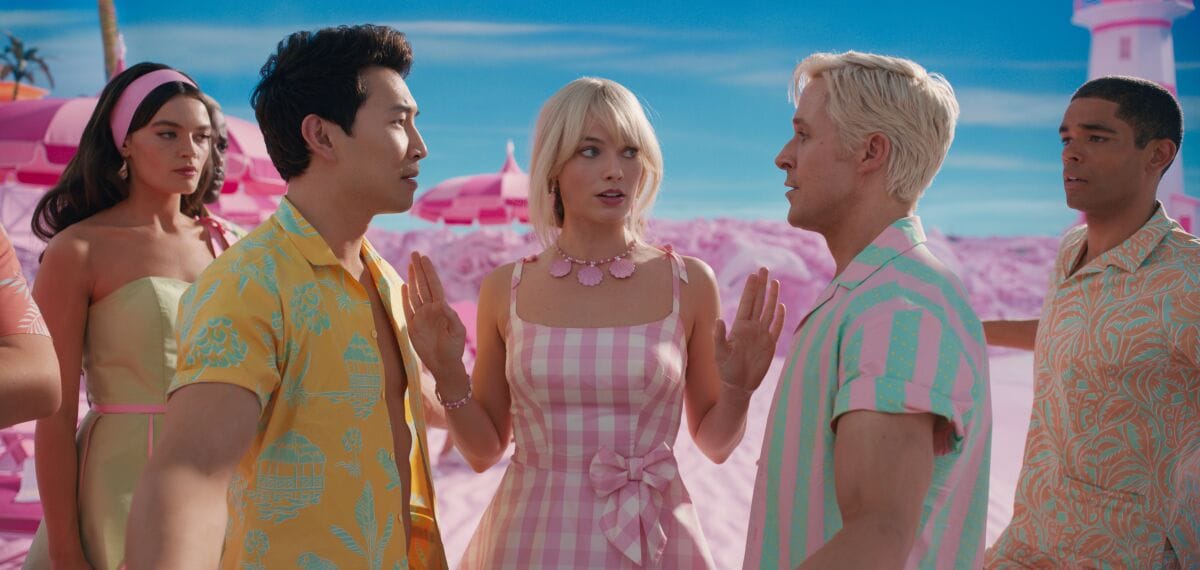When I reviewed The People’s Joker (2022), I made a comparison between that film and Todd Haynes’ Superstar: The Karen Carpenter Story (1988), a personal favourite. Today, writing a review of Greta Gerwig’s Barbie (2023), I find myself thinking about Superstar once again. Haynes’ film casts Barbie and Ken in the roles of Karen and Richard Carpenter, the two halves of soft rock power duo The Carpenters. Forgoing the usual trappings of the music biopic, Haynes chooses instead to focus on Karen’s struggles with anorexia, the disease which caused her early death at just 32. There, the decision to use Barbie dolls instead of actors becomes scathing, making a direct connection between the dolls and the pervasive social conditions which lead to the development of eating disorders. It’s an angry film, not just at Richard Carpenter or the other people in Karen’s life, but at patriarchal modes of thought which enforce unrealistic body standards towards women and consumer capitalism which prioritises economic gain over human wellbeing, systems which lead directly to the development of eating disorders, and systems which Barbie comes to symbolise within the film. The critique of Barbie is just one part of this wholly radical, extraordinary film, but one which carries a lot of weight and is a large part of why the film works so well.
Presenting Barbie dolls as a grave societal ill is not a new concept. Critiquing Barbie dolls has been done so much that it almost feels cliche to do so nowadays. Everything that there is to be said has seemingly already been said. This is the context in which Barbie (2023) has been made, a context which it (purportedly) grapples with directly.
I will begin by saying that, for the most part, I enjoyed the experience of watching Barbie. The genuinely audacious production design of Barbie Land and Mattel Headquarters – despite the latter being ripped from Playtime (1967) – is a welcome sight for those of us completely burnt out on Hollywood films with pallid, grey colour palettes created entirely in post-production. The practicality of the set-building serves to emphasise the artificiality and plasticity of Barbie Land as it evokes the aesthetic of Barbie toys themselves, something which I simply doubt could have been captured in the same way had the environments been created digitally. The sections set in the real world are thankfully minimal, but pretty uniformly feel more like a car commercial than a major motion picture. The cinematography of the whole film is fairly standard and, as a result, it is mostly carried visually by the fantastic work done by the production design team. The sections of the film where that production design isn’t as felt come off as seriously lacklustre in comparison.
Those of us that have seen The Nice Guys (2016) already knew that Ryan Gosling is one of the funniest leading men in all of Hollywood, but he really does get to shine here with some pure goofball himbo material. Simu Liu is predictably juiceless but in a way that sort of works for his role in the film, serving as a foil to the genuine charisma that Gosling brings to the role. Margot Robbie and America Ferrera are also great, more than up to the task of carrying some of the more emotional material in the film. Shoutout to love of my life Hari Nef as well, love her.
The dance numbers are well-choreographed and typically fun, but they feel almost crammed in at certain points. “I’m Just Ken” appears at a frankly bizarre moment and it wasn’t until about halfway through the number that I even began to make sense of what it was doing to advance the film rather than bring it to a screeching halt. I think it speaks to the messiness of the entire film, where despite lots of elements that work really very well, the entire product (and I do mean product) feels… underwhelming at best – at my worst appraisal it’s downright evil.
Which, I guess, brings me to the politics of the Barbie movie. Going in, I felt somewhat alarmed by the fact that all I seemed to see people talking about was whether or not it was “woke” and whether that was a good thing or not. It was usually one of three opinions: the movie is woke and therefore it is bad, the movie is woke and therefore it is good, the movie is not woke enough and therefore it is bad. I struggled to find much in the way of what I would call serious criticism in amongst the sea of intolerable culture war drivel. I wanted to try and engage with the film beyond its place in bizarre arguments which have only ever induced groans out of me. But the film itself simply insists that you engage with it on those terms. It is a consciously political film, so what are those politics? Well, despite what some people had led me to believe going in, they’re effectively the politics of the Mattel corporation. Shocker!
Barbie bravely posits that the Patriarchy is bad and women should do something about it. What should they do? Acknowledge the inherent suffering of womanhood of course!
The thing that I appreciate about Gerwig’s other work insofar as they function as feminist pieces is the simplicity of how they approach women’s stories. They work effectively as feminist pieces because they are concerned with examining what it means to be a girl and the realities of life as a girl. There’s a sincerity to the way those stories are approached that I feel really drawn to and which I think makes them really effective. Barbie, however, is subject to the whims of a multinational corporation, placing upon it the weight of not only the profit-drive, but various image shifts which Mattel clearly wants to make. For all intents and purposes, Greta Gerwig was commissioned to make a Mattel propaganda piece. Which is why it astounds me that the tiniest amount of self-awareness about this has managed to fool people into believing that this is something other than that.
Every joke at the “expense” of Mattel in the film isn’t exactly cutting, amounting mostly to chastising them for not having enough women executives (because that’s the real problem with Mattel). Gerwig’s attempts to examine how Barbie dolls play into predatory capitalist modes of consumption are minimal and toothless because, of course, Mattel have a vested interest in keeping capitalism alive and well, being major beneficiaries of it and whatnot. This, of course, reverberates through the entirety of the film’s political message, which brings me to patriarchy.
Patriarchy as a system of dominance is closely interrelated with other systems of dominance like capitalism and white supremacy. The histories of the developments of each of these systems are not just closely linked but are practically the same history; the development of each is informed by the development of the others and they cannot, for all intents and purposes, be separated. Barbie, however, decides to make this separation. Patriarchy, as it manifests itself in Barbie, appears divorced from capitalism and white supremacy – presumably thanks to our friends the Mattel corporation, though also, disappointingly, Gerwig herself – leaving us with a shallow and violently underbaked understanding. SPOILER#Ken Patriarchy is individualistic rather than systemic, Gosling Ken able to take complete cultural control before instituting any sort of legal framework in Barbie Land enshrining the Patriarchy. The Patriarchy of the Kendom manifests less as gendered domination – there appears to me to be very little in the way of real oppression – and more as just “men doing stuff”. The Patriarchy is when men listen to Pavement and drink beers (as a trans woman who does both of those things – Thank you Greta, very cool!),#SPOILER because the film isn’t allowed to acknowledge the real ways that men oppress women. Instead, the film posits that suffering is the key experience of being a woman, but that this suffering is worth it because it’s “Real”? I don’t know, it’s a messy film and it’s hard to parse what it’s actually trying to say.
I don’t think suffering is an inherent part of being a woman. I haven’t lived as a woman for very long, but my primary experience of womanhood so far has been joy, the genuine, true joy of finally experiencing the world as the person I really am. Barbie doesn’t account for this, it certainly doesn’t speak for me or any other trans people, despite Hari Nef’s presence. It doesn’t speak for any queer people, the whole thing reeks of cisheterosexuality really. I find it hard to imagine how this film is supposed to be empowering to anyone but aspirational, liberal, upper-middle class, white, cis women who want to continue believing that empowerment comes from simply acknowledging how much you’re hurting while continuing to buy into the systems that are hurting you. In many ways, that’s all the film really does.
It’s silly though. It’s silly to scrutinise Barbie like this, because it was always going to be like this. It’s a commercial movie, what did I actually expect? Well, at the very least I expected it to be a little less transparent. You can see right through Barbie, and even if I tell myself that maybe it’s good that the children at my screening were exposed to patriarchy as a concept, I don’t really believe it. I don’t think Barbie is radicalising anyone anytime soon and that’s exactly how Mattel and Warner Bros. want it. They want to continue making billions of dollars while also gesturing towards a “feminism” that only serves to help them make even more billions of dollars.
I’m so conflicted by so much of this that I feel like I can’t make a clear judgement on simply whether I think the film was good or bad. It is a movie, certainly an interesting one with many redeeming qualities, built on a foundation I find utterly distasteful and, frankly, disturbing. Maybe my fondness for Greta Gerwig makes me a bad judge. It both engenders my disappointment and prevents my hatred.
Do I like Barbie? I don’t even know.
Barbie can be seen in cinemas now. For further thoughts on its politics, Lucy recommends this short piece by Devon Price, which helped in the writing of this review.

